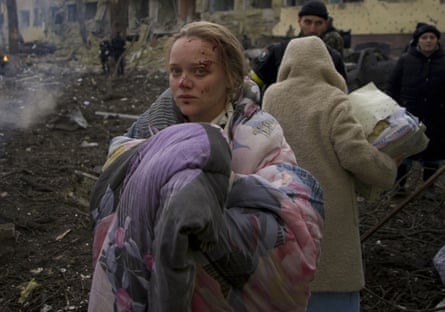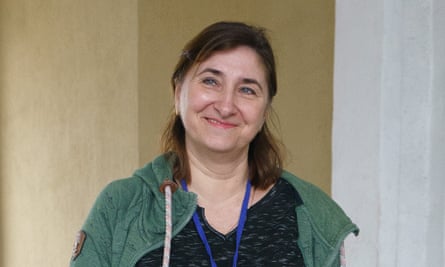When the husband of a heavily pregnant woman came looking for his wife after the Mariupol maternity hospital attack, describing her by her tattoos and earrings, Alina Buzunar had to tell him that she had died, and took the man to the morgue to identify the body.
“He was absolutely calm until he found her,” she said. “Because he told us that until the last, he hoped it was not her. Then he cried a lot. It was a very sad situation.”
An image of the as yet unnamed woman, pale faced and with a bloodied left hip, being stretchered out of the rubble by rescuers is one of the defining images of the terror wrought during the siege of the southern port city. A number of politicians, including Ukraine’s president, Volodymyr Zelenskiy, have called the attack a war crime.
Russian officials said at the time that patients and staff had left and Ukrainian military targets were on site, although there is no evidence to support the claims.
According to Buzunar, the head of the telemedicine department at the regional intensive care hospital, two buses of dazed and bloodied women and babies, some just days or even hours old, arrived at the hospital – the largest in the Donetsk region – for treatment that day, 9 March.
“When the maternity hospital attack happened, we still had police in the city,” she said. “A police car arrived at our hospital and said they were going to bring us the ladies. We said we don’t have the right conditions to treat them, but in the circumstances we didn’t have any choice.
“We didn’t have a specialist, only a neurologist, a gynaecological surgeon and a gynaecology intern. The woman in the image was hit by shrapnel and lost a lot of blood. We tried to save her but we couldn’t.”
After the attack, one of the women gave birth to two babies – a boy and a girl. Three other children were born, some by caesarean section. However, they came just as Buzunar’s hospital had a new problem to deal with: it had fallen under Russian occupation.
Staff had been sheltering in the basement when, on 11 or 12 March (Buzunar is not sure which, due to stress), they heard gunshots. “Russian soldiers said: ‘Lie down on the floor or we will start throwing grenades at you,’ and that’s when they came into the hospital,” she said.
“They talked to the management, who asked them not to interfere with the work of the hospital. The main thing they asked of us was not to leave. They said that anyone who did would be shot.”

It was a tense and stressful period. She could not leave the premises, so she lived in the basement, sleeping on sofas and chairs alongside colleagues, while two or three armed soldiers were stationed on every floor – first Russians, then separatists, she believes. The men were aggressive, repeatedly threatening doctors with machine guns, and they repurposed the first floor, which had been administrative offices, as a military base.
Buzunar said the Russians soon moved in as many as 2,000 civilians from nearby housing, despite not having the means to feed them or anywhere for people to sleep. At around the same time, the governor of the Donetsk region, Pavlo Kyrylenko, said on Facebook that patients and civilians had been taken hostage at the hospital by the Russians and were being used as human shields.
Buzunar said the hospital director, Olha Golubchenko, helped protect staff from the Russian soldiers and “helped us to be brave and strong”. She said she negotiated with the troops and would even stand between them and civilians.
The hospital worked to treat mostly shrapnel and bullet wounds in civilians and soldiers. Russian soldiers were whisked away quickly to recover elsewhere, while Ukrainian soldiers who were unlucky enough to still be in the hospital when the Russians came were considered to be captives, Buzunar said.

“It was already very difficult because we didn’t have a lot of medication and windows were missing because of explosions. It was freezing cold, minus temperatures, so all the patients were kept in the corridors,” she said. “Then a tank came and began to shoot at the hospital. One member of staff had his ribs broken and all the patients who had been lying in the corridor seemed like they were on the open street because the walls were destroyed. All of those patients died.”
Amnesty International has said Russia’s indiscriminate attacks on civilian areas in Ukraine and on protected sites such as hospitals may violate international humanitarian law.
Buzunar, who escaped to western Ukraine in late March, said she asked Russian troops why they had fired at the hospital and they were not able to give an answer. She has no images or video of what happened because people leaving the city are forced to wipe their phones by Russian soldiers. Dozens of other evacuees have also said their phones were checked.
Hospital staff had been told by Russian forces they could not leave until they were replaced by other medical professionals, but Buzunar said new workers had now been brought in from separatist areas and she had managed to flee.
Now she faces the complicated task of coming to terms with her psychological trauma. “When you are working, you try not to show that you’re afraid. But now I’m afraid to even stand by a window because I am waiting for a sniper to shoot me,” she said.
